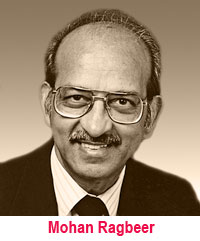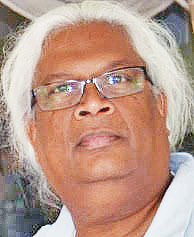Opinions
Who’s hacking?

speculation becomes a truth; the rhetoric jumped from speculation on Russia’s role to repeated statements that Russia helped Trump to win, and to get something negative about him to use later! It boggles the mind that the Obama-Clinton camp can so blatantly use Speculation and Propaganda to manufacture material to impeach the incoming Trump. When are these people going to wake up? Politicians lie routinely, but the media at least should be objective and take some time to gather real evidence and confirm authenticity, and not be blind parties to blatant propaganda. Goebbels would be proud of the US. Meanwhile the media remain quiet about real news: the Russian success in staying the Syrian war; the truce will hold unless the CIA and/or Mossad interfere once again to re-invigorate the US-sponsored mercenaries let loose six years ago to change the Syrian regime, like Iraq. Syria has stubbornly resisted US Oil and its Military Industrial Complex, which provides the hardware for regime change world-wide.
Just three years ago the US made identical charges and threats against China. The Chinese objected and their People’s Daily called the U.S. the “real hacking empire.” Earlier, Michael Heyden, George bush’s NSA and CIA director had said, “The men and women who hack for the NSA belong to a secretive unit known as Tailored Access Operations. The U.S. government doesn’t deny that it engages in cyber espionage. You’re not waiting for someone to decide to turn information into electrons and photons and send it. You’re commuting to where the information is stored and extracting the information from the adversaries’ network. We are the best at doing it. Period.”
US policy accepts certain types of hacking “Just like spies in the physical world, the U.S. cyber spies take pains to obscure their tracks or disguise themselves as something else – hackers from China, say – in case their activities are detected.” So, it’s churlish to complain.
Trudeau has now fired Stephane Dion, the only real intellect in his cabinet, and no US lackey, but not the man for Foreign Affairs today, and appointed Ms Freeland instead. Freeland is a media favourite, from her background as a journalist and free trade advocate, who impresses a monolingual continent with her linguistic skills. But she is rigidly anti-Putin, not a good base for a Foreign Minister, who should be open-minded. Trump is as likely to dismiss as to accept her, but she won’t change his mind; also, she is wrong about the Crimea’s relationship with Russia and should review the history. I fear that, like Trudeau, she will sell the Canadian middle class and small business to enrich already fat corporations.
In Hamilton the industrial area thrived before NAFTA with small and medium-sized manufacturing industries that made everything sold in the big stores. Today, those things come by trucks from somewhere far, multiplying the need for petroleum, for which the US gutted Iraq and Libya, and most recently, engineered a coup in Brazil, and now plots against Venezuela, Iran and Russia, all oil-sufficient, and reachable from US bases, threatening on every continent.
The US debt to the Rothschilds is nearing $20 trillion. Oil trades in dollars, which President Nixon initiated when he ran short of gold in the 1970s. In 1945, the Bretton Woods agreement made the dollar the international currency, convertible to gold at $35 an ounce. He severed that arrangement, prompting the cautious to surrender dollars for gold. To prevent a run on gold and the collapse of the dollar, Nixon persuaded Persian Gulf oil producers to sell for dollars only, in exchange for US protection. Thus the petro-dollar, the presence of American armour throughout the Middle East and the imperative to control oil everywhere; hence the attacks on Iraq, Libya, the silent take-over of Canadian assets, current action against Brazil, Venezuela etc. to secure the petrodollar, which was threatened by Saddam Hussein and Ghaddafi’s acceptance of any good coinage.
One lived off the land when exploring
 Romeo Kaseram
Romeo Kaseram
Coming to think about it, there was no way one could go hungry or thirsty, or get lost, in any neighbourhood when I was growing up back home. Exploring a new neighbourhood always turned up hidden treasures in the most unlikely places, be it a public stand-pipe for a quick drink of water, or a mango tree in a corner spot where a junction met a side road, which in its season was dropping to the ground with frequent thuds numerous small and sweet mangoes, appropriately doubly-named in French for its sugary content, “Doux-doux”, or “Sweet-sweet”.
That emphasis was made known back then, and perhaps continues today, was
through repetition, as the name of the mango suggests. Thus, someone would recommend, “Girl, you must try the mangoes from the tree by the junction. Those mangoes ‘sweet-sweet’ too, too bad.” So it is that this mango was named, perhaps in a time when French was spoken, or in its patois, becoming known then, and today, as “Doux-doux”.
To pick up a few of these extra-sweet mangoes off the ground, so fresh off the tree the stem was still wet with gooey, white sap that would put spots of indelible brown stains on any white shirt if not handled carefully, as well as its ripened yellow still warm with overhead sunshine, then to wash it by the stand-pipe, was to have a ready-made snack to quell any hunger pangs. One lived off the land when exploring new neighbourhoods back home, so to speak.
To finish the mango off took a long, cool draught by putting the mouth under the gushing stand-pipe, and perhaps also soaking the head and hair to cool down after such hot walking in the unrelenting sun, was to hold back the growling of the stomach, which was loud enough that it attracted a responsive, apprehensive growl from a stray dog intently following with sniffing, territorial curiosity.
There was no need to fear getting lost, or going hungry or thirsty, when exploring a new neighbourhood. To walk through the winding network of streets with no names was to marvel at its narrowness, where two cars passing each other in opposite directions had barely room enough for a pin to fit in the space between the two side mirrors.
To avoid these passing vehicles was to agilely step up onto someone’s front stairs, and standing there as the vehicles roared by was to hear with growing hunger the knock of metal spoons on cast iron pots, and with this, the controlled explosions of prepared food falling into the roil of sizzling oil. With this came the heady smells of seasonings, of stews bubbling in pots, of pot-lids lifted so curries could get its final dash of salt, all just beyond the third step and through the wooden front doors on the stairs, with these a mere foot away from the street with vehicles easily making two lanes of traffic where one car should realistically fit.
Walking through these streets presented a mix of houses, some concrete, others red brick and raw; occasionally, something haphazard stood in the back of a lot, built out of discarded boards, its galvanized roof rusted, under which stood water barrels to catch rain water. The front of such a house would be covered with tall grasses growing inside an abandoned car, with parts of its body missing in a door torn away, or a gaping hole where the back glass was removed, and a brown-discoloured steering wheel attached to a dashboard cannibalised of gauges and trailing exposed wires.
To stand and gaze into such a yard was to welcome the charge of a large dog, its entire mass of flesh and rippling muscles as intent as a battering ram, rushing with the power of an approaching train towards the shaky, boarded gate leaning at an angle on cut-out pieces of a bicycle’s tire bent-nailed on as makeshift hinges. The dog would hit the gate at the speed of sound, and the boom as the sound barrier was broken stretched the elasticity of the rubber hinges almost to breaking point. The shuddering of the gate, transferred to the fence of nailed boards, pieces of tin, and its mismatched mix of thick, uneven branches for posts, was all part of the miracle holding back the breach, so the dog remained on the other side of the fence catching its breath before baring its canines and then erupting into a welcoming serenade of ferocious, throat-ripping barking.
To move on from such a welcome was to note a dryness in the mouth, brought about by the warm weather and the near-death experience. It was time for a drink, and in neighbourhoods as these, it was only a matter time before a parlour was found under someone’s house. To walk into such a place was to note a stack of water glasses on the counter. The proprietor arrived after loud knocking on the counter using a five-cent piece, the price of a tall glass of homemade orange juice served with ice-cubes on a hot day exploring a new neighbourhood.
